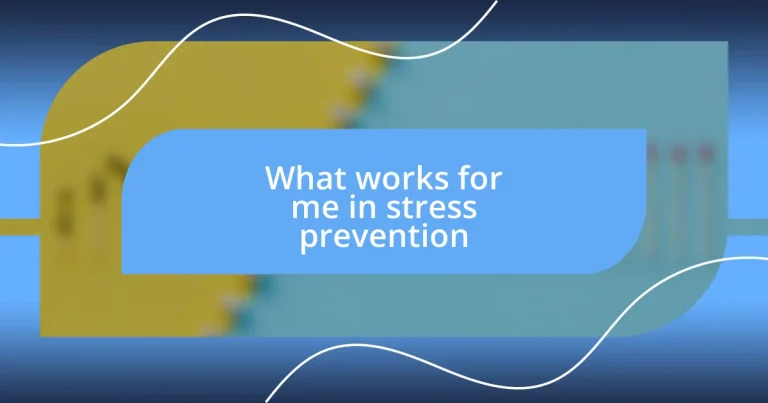Key takeaways:
- Understanding stress impacts both mental and physical well-being, highlighting the importance of recognizing and managing it effectively.
- Identifying personal stress triggers and implementing coping strategies, such as prioritization and time management techniques, can significantly alleviate stress levels.
- Incorporating physical activity, mindfulness, and nurturing social connections are essential components for developing a balanced lifestyle that helps mitigate stress.
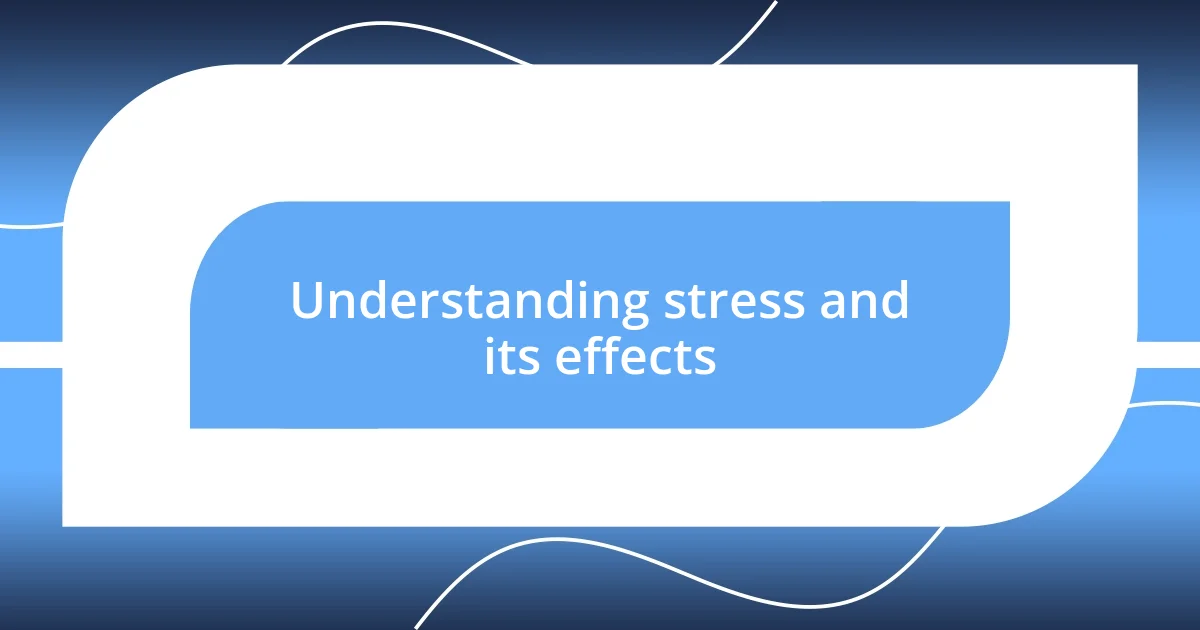
Understanding stress and its effects
Stress is a natural response to challenging situations, but its impact on the body and mind can be profound. I remember a time when work deadlines piled up, and I felt my heart racing and my thoughts spiraling. Isn’t it intriguing how our bodies can react so intensely to perceived threats, even if they’re just looming tasks?
Over time, I’ve learned that stress can manifest in various ways, from irritability and anxiety to physical symptoms like headaches and fatigue. Observing these changes in myself often made me wonder, how could something so invisible to others have such a tangible effect on my wellbeing? It’s almost as if stress dims our mental clarity and colors our emotions, creating a haze that clouds our ability to enjoy life.
Understanding the effects of stress is critical in our fast-paced lives. I often find myself reflecting on this when I notice my thoughts racing at the end of a busy day. Have you ever felt that weight on your chest or a knot in your stomach, making every challenge seem insurmountable? It’s these moments that serve as reminders of the importance of recognizing stress in our lives and finding effective ways to manage it.
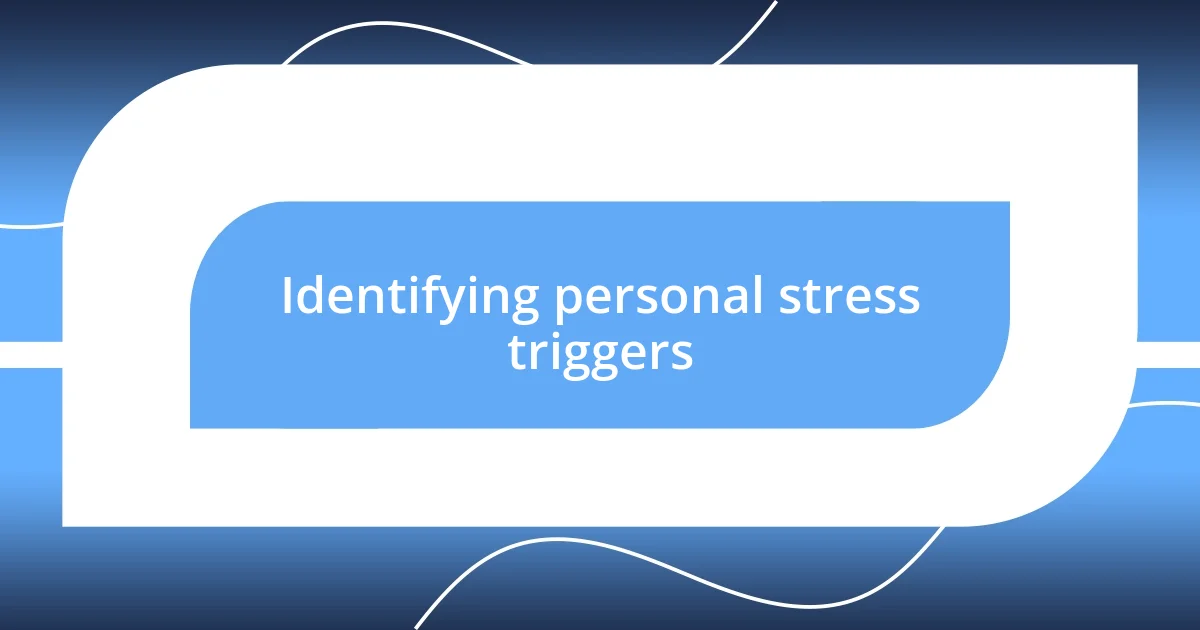
Identifying personal stress triggers
Identifying personal stress triggers is an essential step in managing stress effectively. For me, recognizing my triggers was a journey. One specific instance was the realization that tight deadlines made me feel overwhelmed. I began to connect this stress with specific feelings of dread and anxiety, which acted like red flags signaling that it was time to implement coping strategies.
I often found that situations involving conflict—like disagreements with colleagues—heightened my stress levels significantly. Reflecting on these experiences helped me identify that my emotional responses were more intense in high-stakes discussions. By keeping a journal, I’d jot down my feelings when I felt stressed, which provided valuable insights into patterns that I hadn’t fully recognized.
Acknowledging personal triggers also means being honest with ourselves about our limitations. There were times when I would overcommit to social obligations without considering how they affected my mental space. Realizing that balancing my energy was crucial, I started prioritizing activities that filled me with joy rather than depleting me, creating a clear distinction between enriching experiences and those that drained me.
| Trigger Type | Emotional Response |
|---|---|
| Tight Deadlines | Overwhelm and Anxiety |
| Conflict with Colleagues | Increased Irritability |
| Overcommitment to Social Events | Exhaustion and Resentment |
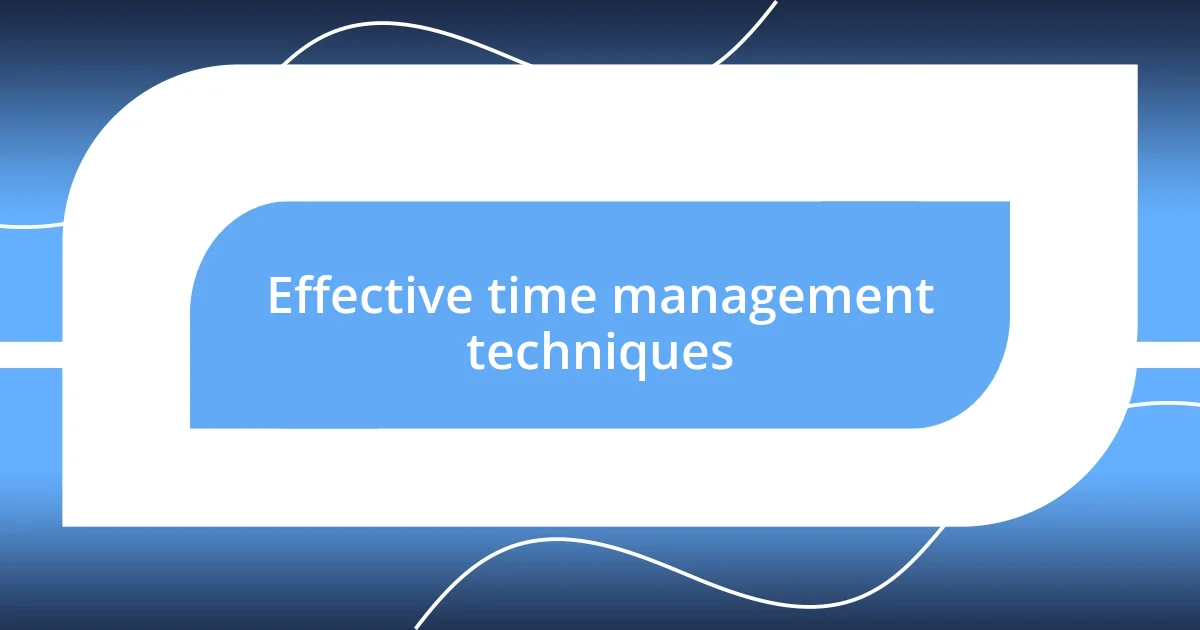
Effective time management techniques
Effective time management has been a game-changer for me in preventing stress. When I started breaking down my tasks into manageable chunks, it was like lifting a weight off my shoulders. I try to prioritize my to-do list each morning, focusing on what truly needs to get done, which helps clear that mental fog.
Here are some time management techniques that have worked for me:
- Prioritization: I use the Eisenhower Matrix to distinguish between what’s urgent and important, so I tackle high-priority tasks first.
- Time Blocking: Allocating specific blocks of time for tasks ensures I stay focused and reduces the overwhelming feeling of having too much on my plate.
- Set Deadlines: Even for tasks that don’t technically have deadlines, I create my own to instill a sense of urgency that keeps me moving.
- Limit Distractions: I’ve learned to silence notifications and create a designated workspace to help me concentrate better.
Another technique I find invaluable is assessing how I spend my time. Recently, I tracked my daily activities for a week and was shocked to discover how much time I wasted on social media. It was an eye-opener! By realizing the sources of my distractions, I could adjust my schedule, allowing for more productive work periods.
- Daily Reflection: At the end of the day, I spend a few minutes assessing what I accomplished, which not only boosts my confidence but also guides my planning for the next day.
- Flexibility: I remain open to adjusting my schedule based on how I feel; some days I need more breaks, and it’s okay to listen to my body.
- Use of Tools: I love apps like Trello or Asana for keeping my tasks organized, allowing me to visualize what needs to be done, and providing a sense of achievement as I check things off.
These approaches help me create a balance that feels right, reducing the feeling of being overwhelmed and ultimately, allowing room for more joy in my day-to-day life.
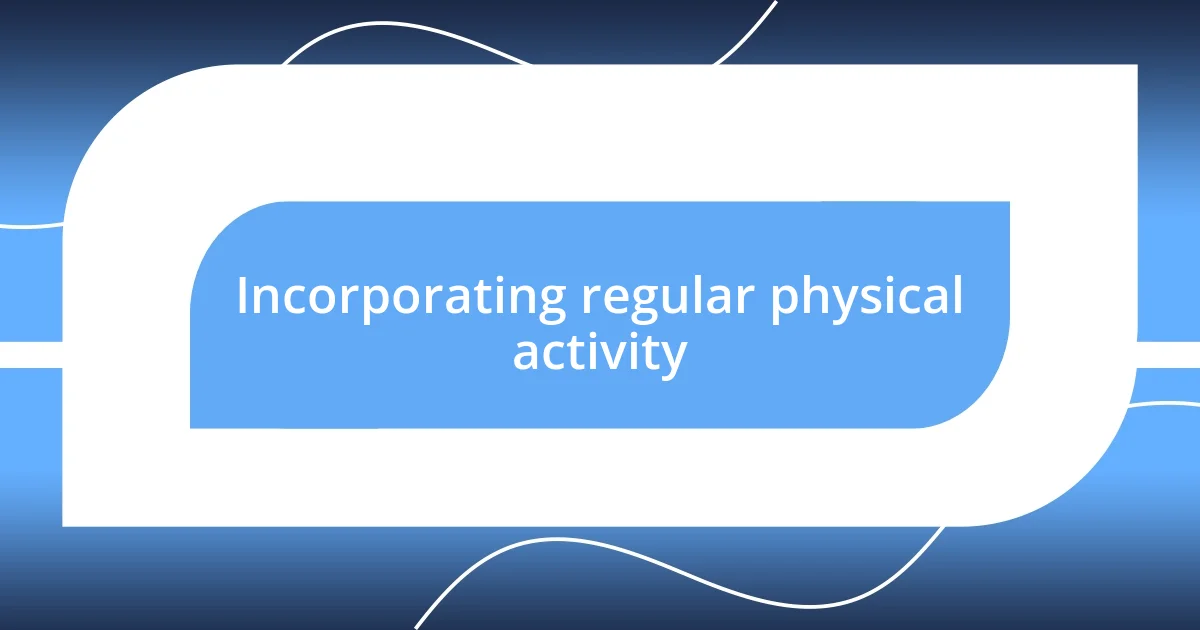
Incorporating regular physical activity
Incorporating regular physical activity has become a cornerstone of my stress management routine. I vividly remember a particularly stressful week at work when everything felt overwhelming. After a long day, I decided to go for a brisk walk. As I stepped outside, I felt the tension begin to melt away with every step I took. The fresh air not only cleared my mind but also reignited my energy. Have you ever felt that rush of clarity after moving your body? It’s remarkable how just a little exercise can shift your mindset.
I also discovered that the type of physical activity I engage in significantly impacts my stress levels. On days when my schedule allows, I love hitting the gym for a high-intensity workout. It may sound intense, but pushing myself in those sessions offers a sense of release. That adrenaline rush is almost therapeutic! On the other hand, there are moments when a calming yoga session is what I need. Stretching and focusing on my breath creates a peaceful stillness that helps me reconnect with my feelings. How do you prefer to move your body?
What I appreciate most about incorporating physical activity is that it doesn’t have to be a huge time commitment. Even simple movements, like doing a few squats while waiting for my coffee to brew or taking the stairs instead of the elevator, can make a difference. I’ve found that small, consistent actions contribute to my overall well-being, allowing me to tackle stress more effectively. Isn’t it empowering to realize that we can take charge of our stress levels by being active, even in small ways?
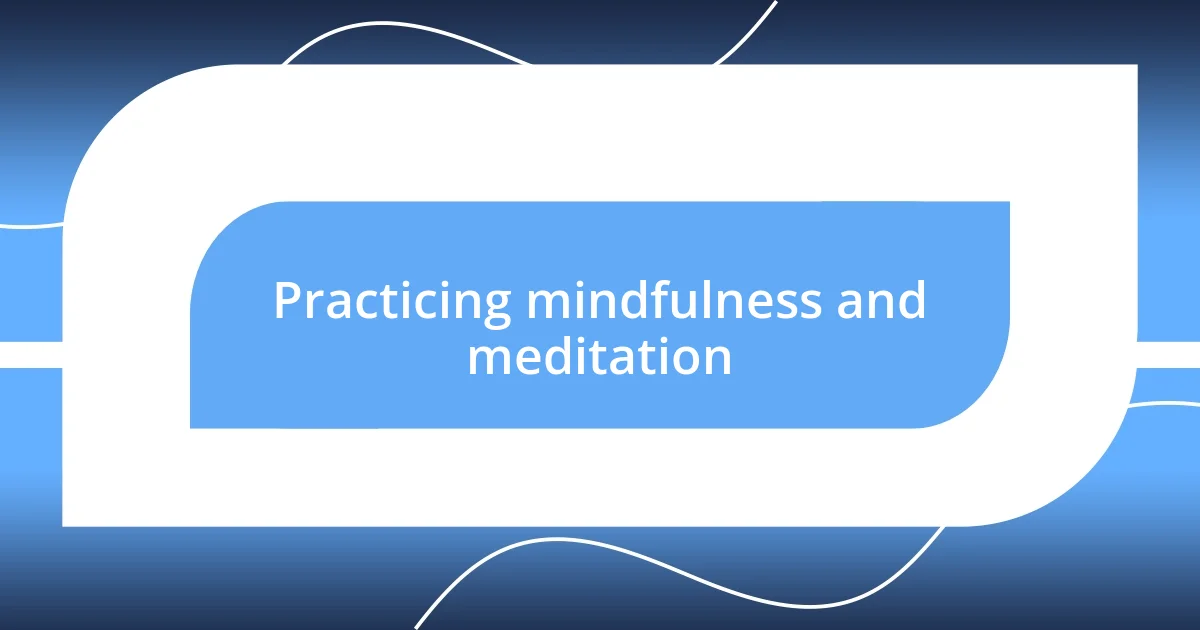
Practicing mindfulness and meditation
Practicing mindfulness and meditation has truly transformed my approach to stress prevention. I remember a particularly chaotic day when my mind was racing just trying to keep up. Taking a few minutes to sit quietly, focus on my breath, and just be present in that moment allowed me to find a sense of calm. Have you ever paused to truly notice your breath? That simple act feels like a reset button, helping me shed the worries that weigh me down.
Incorporating mindfulness into my daily routine doesn’t always mean a lengthy meditation session. I often practice mindfulness during mundane activities, like washing the dishes or sipping my morning coffee. Focusing on the warm water running over my hands or the rich aroma of the coffee grounds heightens my awareness of the present. It’s fascinating how little moments can cultivate a deeper sense of peace. I often find myself wondering, “What other mundane tasks can I transform into moments of mindfulness?”
Meditation, on the other hand, has its unique gifts for me. I typically set aside time in the evening to engage in guided meditation, which has been a game-changer for my sleep quality. I vividly recall how restless I used to feel at night, replaying the day’s events endlessly in my head. Now, with a soothing voice guiding me through visualization and relaxation techniques, I drift off peacefully. It makes me ponder: how much better could our days be if we gave ourselves the space to unwind and reflect?
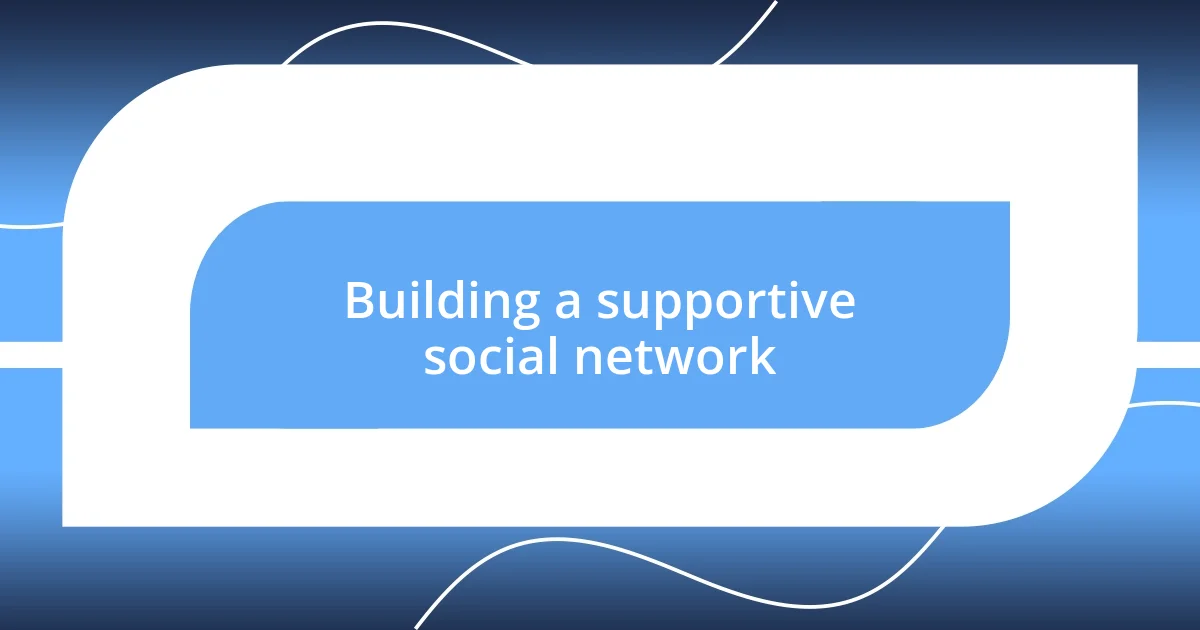
Building a supportive social network
Building a supportive social network has been essential in my journey toward managing stress. I remember during a particularly tough time at work when I felt completely isolated. Reaching out to a close friend for a simple chat changed everything; just sharing my thoughts made the burdens feel lighter. Have you ever experienced that relief when someone genuinely listens? It’s amazing how a few heartfelt words can shift your entire perspective.
What I truly value about my social network is its diversity. Surrounding myself with a mix of personalities—from optimistic friends who uplift me to grounded ones who offer practicality—has created a safety net during stressful periods. I recall one evening, gathering with these friends for a casual dinner. The laughter and connection reminded me that I wasn’t alone in facing challenges. How do your friendships support you during tough times? It makes me reflect on the role our connections play in resilience.
I find that actively nurturing these relationships is crucial. Simple gestures like checking in with friends or organizing get-togethers keep those bonds strong. The more effort I put into connecting, the more I receive in return. I often ask myself, “What can I do to make my friends feel valued?” It’s clear to me now that this reciprocity creates a more profound sense of community and trust, helping us all weather life’s ups and downs together.
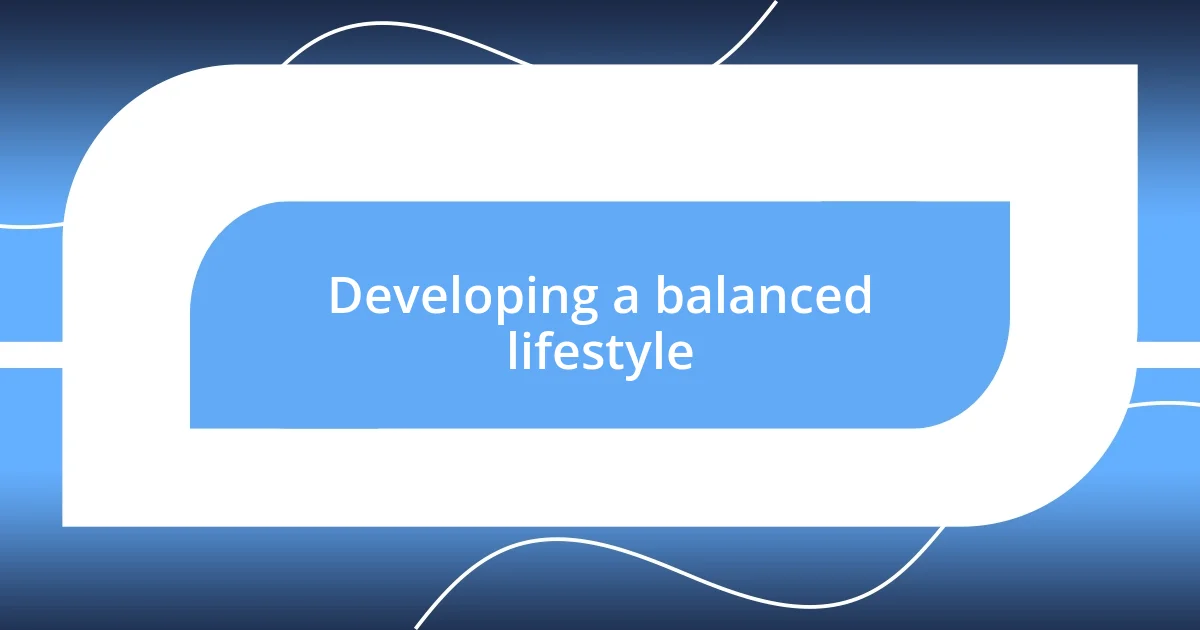
Developing a balanced lifestyle
Developing a balanced lifestyle is something I focus on daily to keep stress at bay. I recall a time when my schedule was packed to the brim, leaving little room for self-care. Integrating regular exercise became my anchor. Whether it’s a brisk walk in the morning or a short yoga session in the evening, these moments not only energize me but also help release the built-up tension. Have you noticed how physical activity can completely change your mood and mindset?
One of my favorite practices is meal prepping on Sundays. It may sound mundane, but knowing I have healthy meals ready for the week alleviates a lot of last-minute decision stress. I vividly remember the chaotic days when I would default to quick, unhealthy snacks that left me feeling sluggish. Those vibrant, balanced meals I prepare now not only nourish my body but also set a positive tone for my week. Isn’t it incredible how what we put into our bodies influences our overall well-being?
Additionally, I strive for a harmonious balance between work and leisure. There’s a profound difference when I consciously allocate time for hobbies or simply winding down with a good book. I often hear friends say, “I never have time to relax,” and I used to feel that way too. But I’ve learned that carving out just a couple of hours each week for something I love makes a massive difference in my stress levels. What activities bring you joy, and how might you weave them into your routine for a more balanced life?












